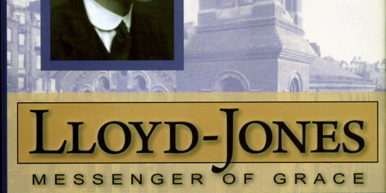
Review of “Lloyd-Jones: Messenger of Grace” by Iain H. Murray
By Dr. Michael A.G. Haykin –
Iain H. Murray, Lloyd-Jones: Messenger of Grace. Edinburgh/Carlisle, Pennsylvania: The Banner of Truth Trust, 2008. 274 pages. Hardcover, $28.00.
I am biased when it comes to books by and on Martyn Lloyd-Jones. By the grace of God, this man’s preaching and teaching has exercised such an influence for good in my life, I find it hard to pick up a book like this and not be reminded again of the central importance of this man’s ministry—not simply for my life—but for the life of the Church in the modern Western world. I trust that I do not think his ministry is the model for every conceivable Christian ministry (see the remarks on p.xi-xii, 6-7), but here is a man whose teaching the Church in our day needs to hear and heed. Lloyd-Jones’ great concern was “the recovery of true spiritual power amid the decline of Christianity in Britain”—and we might add, “and in the western world in general” (p.xiii; see also p.26-28). Some of his emphases in this regard were controversial, in particular his assertion of a distinct second work of the Holy Spirit, which he held in common with such Puritan authors as Richard Sibbes and Thomas Goodwin (p.127-163). And it would be easy to dismiss his great concern because of one’s disagreement with him on this specific issue. But that would be a great mistake. Murray has his disagreements with “the Doctor” in this matter (p.162-163), but he is rightly confident that Lloyd-Jones’ life and teaching can still be a great help to us today. The first chapter, entitled “The Lloyd-Jones Legacies” (p.3-28), is thus in some ways the key theme of the whole book—the way in which the emphases of Lloyd-Jones’ remarkable ministry are needed as much now as when they were first made.
In tracing the specific ways that Lloyd-Jones’ great concern for true spiritual revival is of present significance, Murray especially looks at: the Welshman’s deep conviction about the life-changing power of biblical preaching (p.17-22, 29-54) and that true preaching is a gift of the Holy Spirit (p.83); his evangelistic use of the Old Testament (p.55-83)—a rarity today among Reformed and Evangelical men; and his quarrel with fellow Reformed men who believed they could work with out-and-out liberals (p.165-208—see also p.263-267). Along the way there are numerous details about his preaching (p.85-106, 227-255) and a very helpful comparison between Lloyd-Jones and the Victorian Baptist C.H. Spurgeon, the similarities of their ministries and also the differences between them (p.109-125). Finally, a CD in a jacket at the back of the book which contains a tremendous sermon by Lloyd-Jones on the way men and women die—either “in their sins” or “in the Lord”—serves as a reminder of the power of God that rested on his preaching.
What is clear from Murray’s examination of Lloyd-Jones’ legacy is that although his ministry cannot be taken as an exact blueprint of what biblical ministry looks like, its main emphases can be seen as typical: Christianity as fundamentally and ultimately a God-centered religion, the Church’s desperate need for the power of the Holy Spirit, the glorious transformation brought about by anointed preaching. Oh for such in our day!
Dr. Michael A.G. Haykin is Professor of Church History and Biblical Spirituality at The Southern Baptist Theological Seminary as well as Director of The Andrew Fuller Center for Baptist Studies. This review first appeared at AFCBS book review page.

